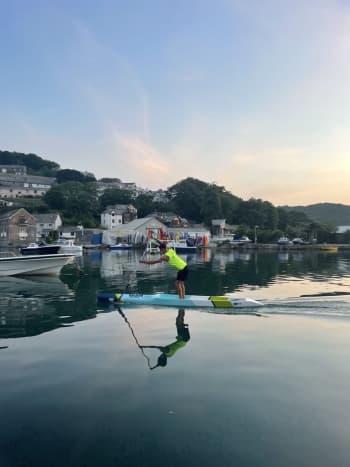The rise of participation and professionalism in Stand-Up Paddle boarding
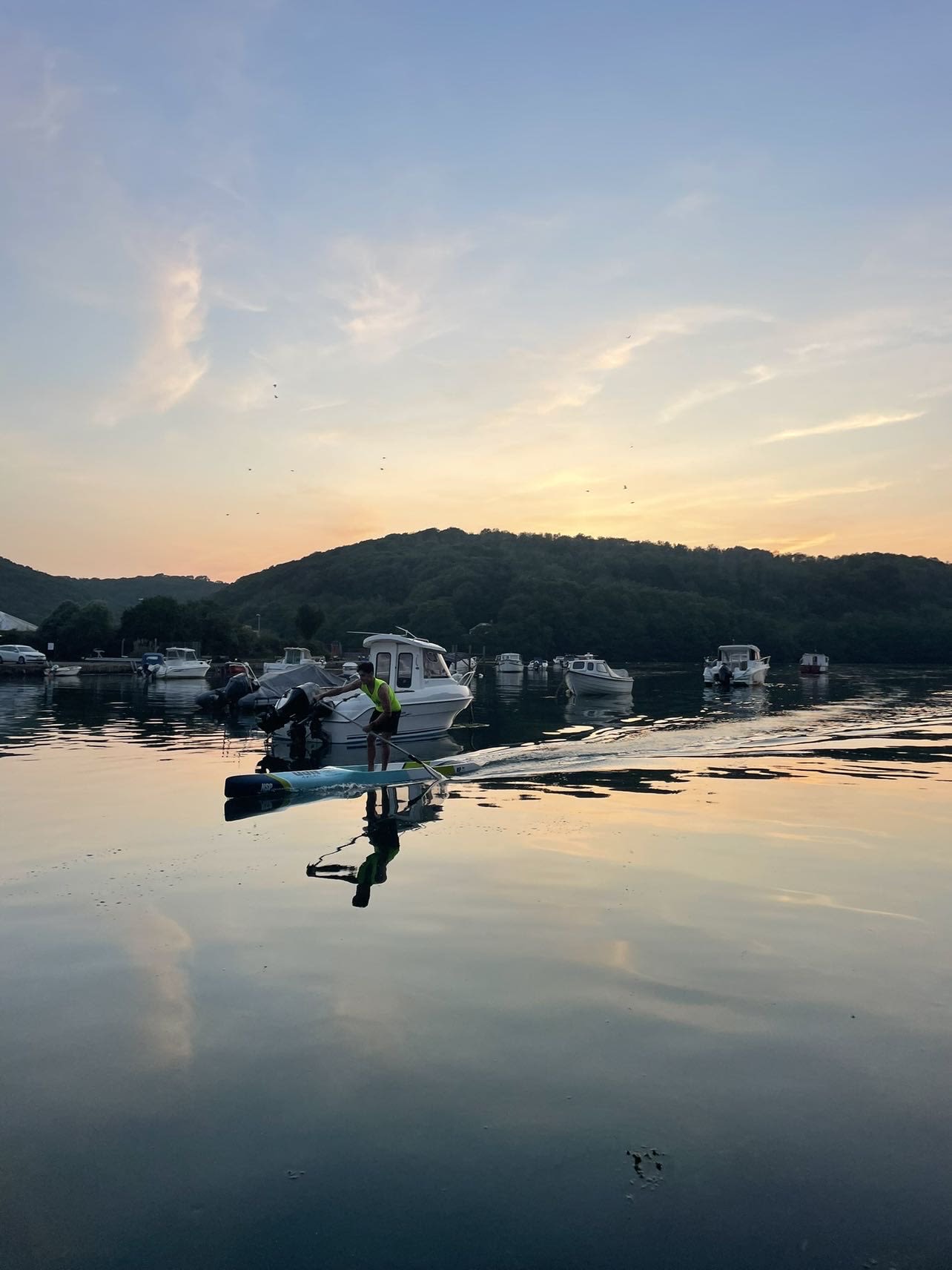
Whether it’s swimming, sailing, canoeing, or diving, many people have taken part in at least one water sport in their lifetime. For some, however, water sports become a more central focus, with daily training and rising competition pushing them to their maximum potential.
Stand-Up Paddle boarding (also known as SUP) is a water sport which is a cross between surfing and canoeing, the athlete stands on the board uses their paddle to pass through the water.
SUP has seen a massive rise in participation and professionalism in the last decade, however, many people don’t associate paddle boarding with racing and competing, yet many people primarily associate the sport with leisure and recreational use. The sport has its National Governing Body which is Paddle UK and the two International Governing bodies which are the International Surfing Association (ISA) and the International Canoeing Federation (ICF) both of which hold annual World Championships, alongside numerous other SUP competitions which are held worldwide all year round.
Despite the modern-day sport being over 80 years old, in the last decade, the sport has grown from 1.99 million participants in 2013 to 4.13 million in 2023 (2023, Statista.) According to the ISA, SUP is now the world’s fastest-growing water sport.
The statistics of participation in SUP over the last ten years- Statista 2023
The statistics of participation in SUP over the last ten years- Statista 2023
Graph showing the statistics of participation in SUP over the last ten years- Statista 2023
Graph showing the statistics of participation in SUP over the last ten years- Statista 2023
Graph showing the statistics of participation in SUP over the last ten years- Statista 2023
Graph showing the statistics of participation in SUP over the last ten years- Statista 2023
The rise in participation worldwide
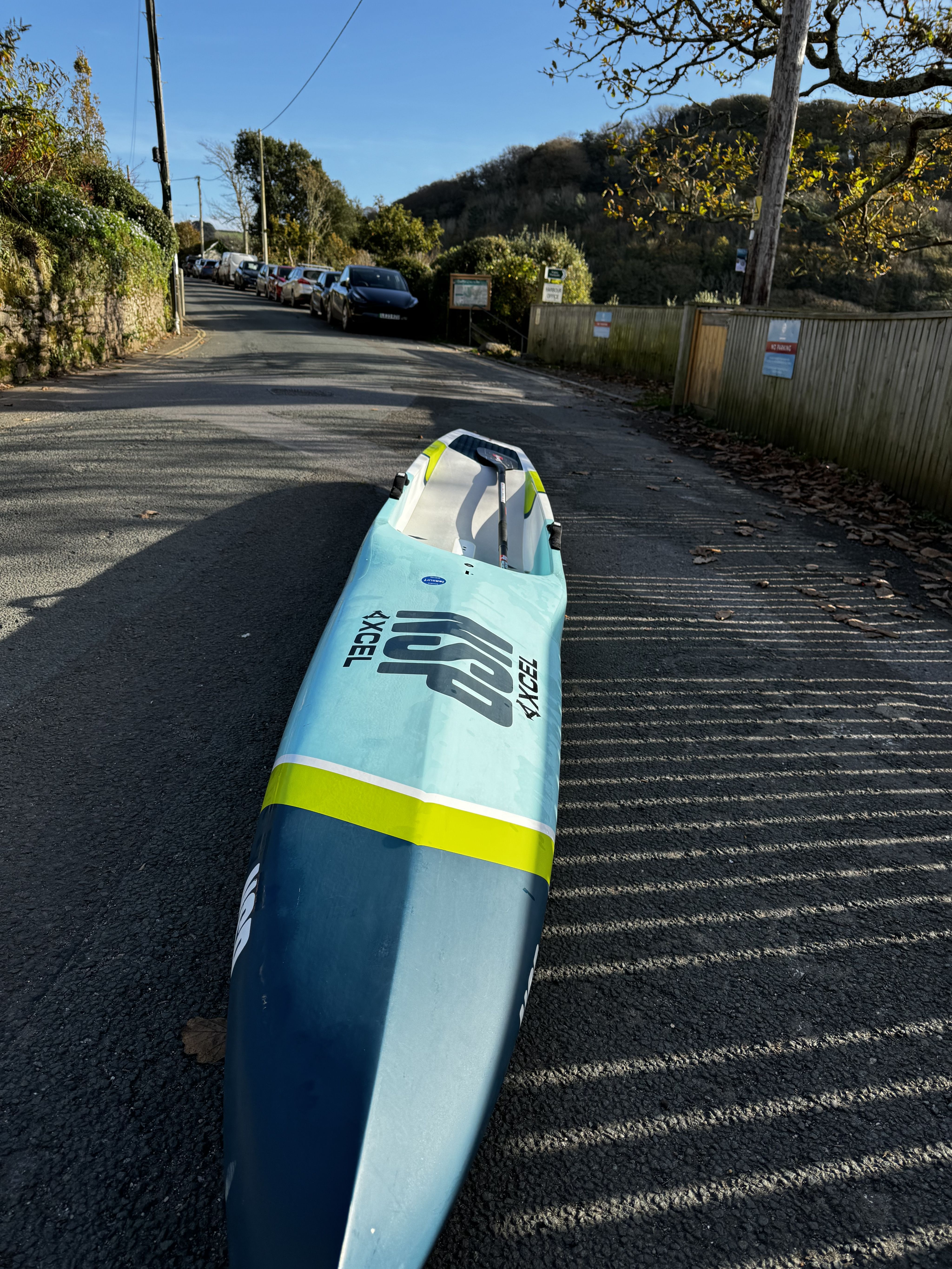
Dino Halsey- SUP enthusiast. Photo taken by Dino Halsey
Dino Halsey- SUP enthusiast. Photo taken by Dino Halsey
The rise in participation.
When looking into the rise in participation of SUP, it is important to firstly recognise that those who don’t compete in the racing have a significant role and impact on the growth of the sport. The sport had a breakthrough in the early 2000s in California which provided a kickstart in the sport globally.
Dino Halsey is a SUP enthusiast from the United States, where the sport first gained its prominence, he regularly takes part in SUP but does not currently compete. Dino’s involvement, like that of many others, is essential in maintaining the sport’s popularity and encouraging new participants to join.
Dino explained that he got into SUP a little differently from the way others may have gotten into it. He shared: “I actually had some health problems about 10 years ago and I was in the hospital for a little while- when I got out my father brought me my first ever wetsuit for Christmas and he told me ‘I want you to go and use this- go and do something with it.’ While I was in the store when I saw a giant surfboard standing up against the wall, I asked the worker what it was, and he said it was a paddle board.
"I went home and drove back an hour later and brought it, that’s where it all started, the first time I hit the water with the board I fell in love with it, and I have been doing it for about 10 years ever since and I just absolutely love the sport.”
Similarly to this, SUP racer Samantha Rutt from Norfolk, who currently works for Paddle UK explained that she also got into the sport through a neck injury that she sustained when she was a surfer around 12 years ago. She developed the injury through a mixture of snowboarding, horse-riding and kickboxing which led to Samantha losing the proper use of her right arm. Samantha said: “Trying to get back into surfing was really difficult as I had lost the use of my triceps and my pecks, so stand-up paddling boarding was kind of like a fringe sport at the time, so I thought if that means that I can get out in the ocean then I’ll give it a go and then it just kicked off from then.”
In contrast to Dino’s more cautious approach to competing, Samantha said: “I knew that I wanted to compete right away, it took me about 12 months to find the race side of things, before paddle boarding I was doing mixed martial arts and kickboxing and competing at that level. I went down to Poole Harbour and found people to find anybody that was into SUP racing, as was and still is like a SUP/ Water sports heaven in Poole, and then got into it from there.”
“It’s just not in my personality to go and potter around, I might as well race these things.”
Photograph of Samantha Ruth on her paddle board, Photo taken by Samantha Rutt.
Photograph of Samantha Ruth on her paddle board, Photo taken by Samantha Rutt.
Blue Ewer
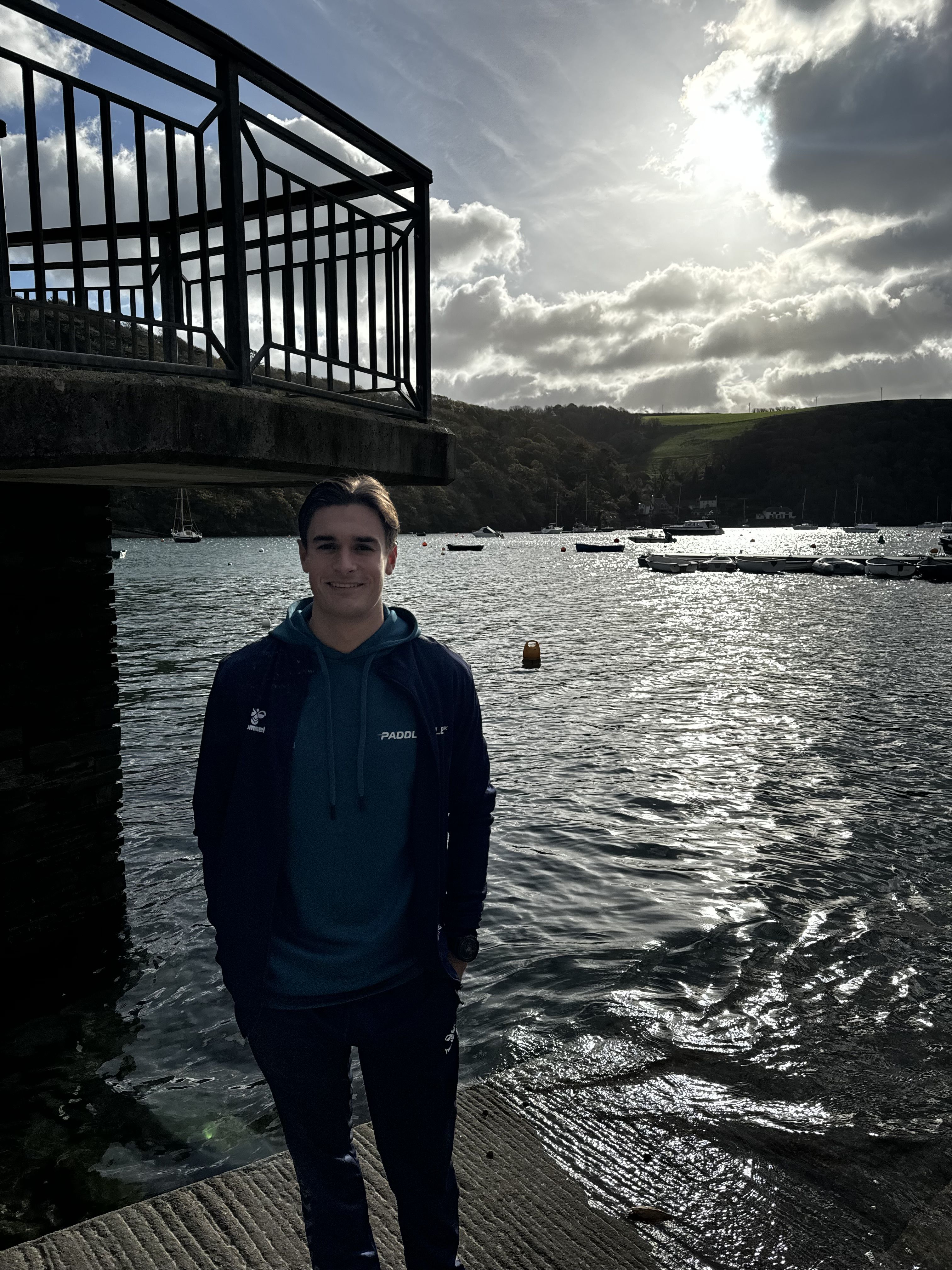
SUP has recently held its ICF SUP World Championships which took place in Sarasota, United States where competitors from all over the world competed. One notable racer, Blue Ewer from Devon, was racing for Great Britain and placed in the top 10 for his technical race and 17th overall in his long-distance race. Blue was frustrated due to taking an unfortunate fall off his board in the first few meters of the long distance which set him back in the race, this meant he had some catching up to do to get to where he wanted to be.
Despite the setback, Blue explained: “I managed to catch the lead group again but used all my energy in doing so and had to settle for a spot at the back of the lead group finishing 17th, far from where I wanted to be but only one minute from first place in a 65-minute race.”
He reflected: “I’m happy with my paddling after what happened but very frustrated as I know without the fall at the start I could have been fighting for a place on the podium."
Prior to his journey over to the United States Blue shared his journey in SUP and what it means to him. Blue said: “I have been doing SUP for about seven to eight years now, my parents got me into it having always been brought up by the water and then I started competing when I was about 15 years old.” Blue explained that he works in his parent’s water sports shop when he is taking part in training as he is too busy to get a full-time job.
Below is an audio clip of an interview with Blue before he took off to the Sarasota, US for the ICF SUP World Championships.
Audio Clip from Blue Ewer, recorded by Izzy Jackopson
Audio Clip from Blue Ewer, recorded by Izzy Jackopson
Photo of Blue Ewer training in Looe river- Cornwall. Photo taken by Izzy Jackopson
Photo of Blue Ewer training in Looe river- Cornwall. Photo taken by Izzy Jackopson
The rise in professionalism
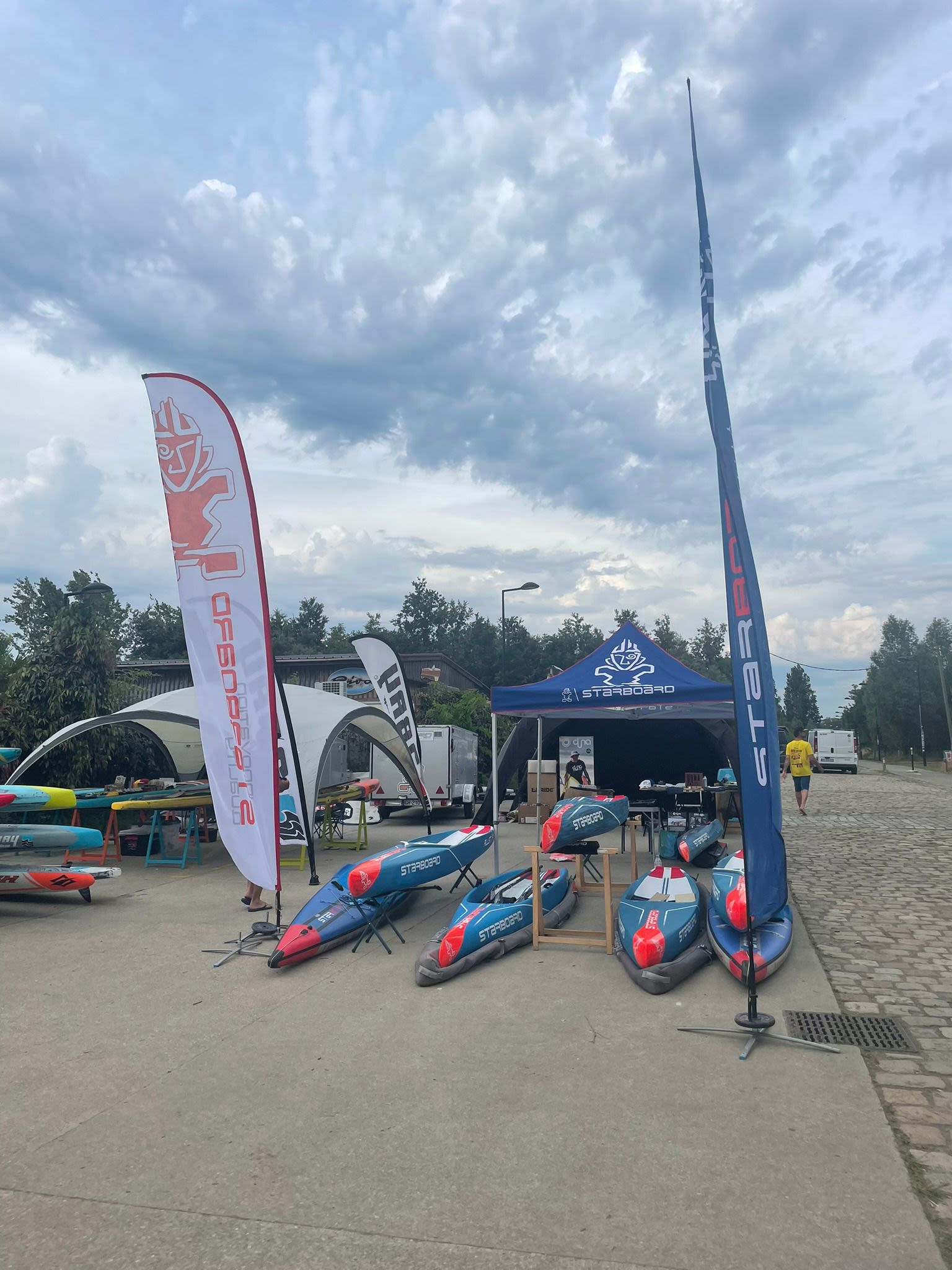
Blue and Samantha have achieved remarkable success during their SUP careers. Blue explained that his proudest moment to date during his SUP career was when he won a five-star Euro tour event in Bordeaux last year in 2023, he gave an honourable mention to his top five finish at the World Championships before this year but said, “that moment was the most memorable achievement for me so far.” Furthermore, Samantha’s greatest achievement was when she gained the Guinness world record for becoming the fastest person to paddle from Northern Ireland to Scotland in around five hours, beating the men’s time by an hour and a half.
During their time of excellence in SUP, they have witnessed the rise of professionalism through the sport first-hand and have also been able to see the challenges the sport has faced along the way.
“The sport has changed massively but I still think it’s evolving.”
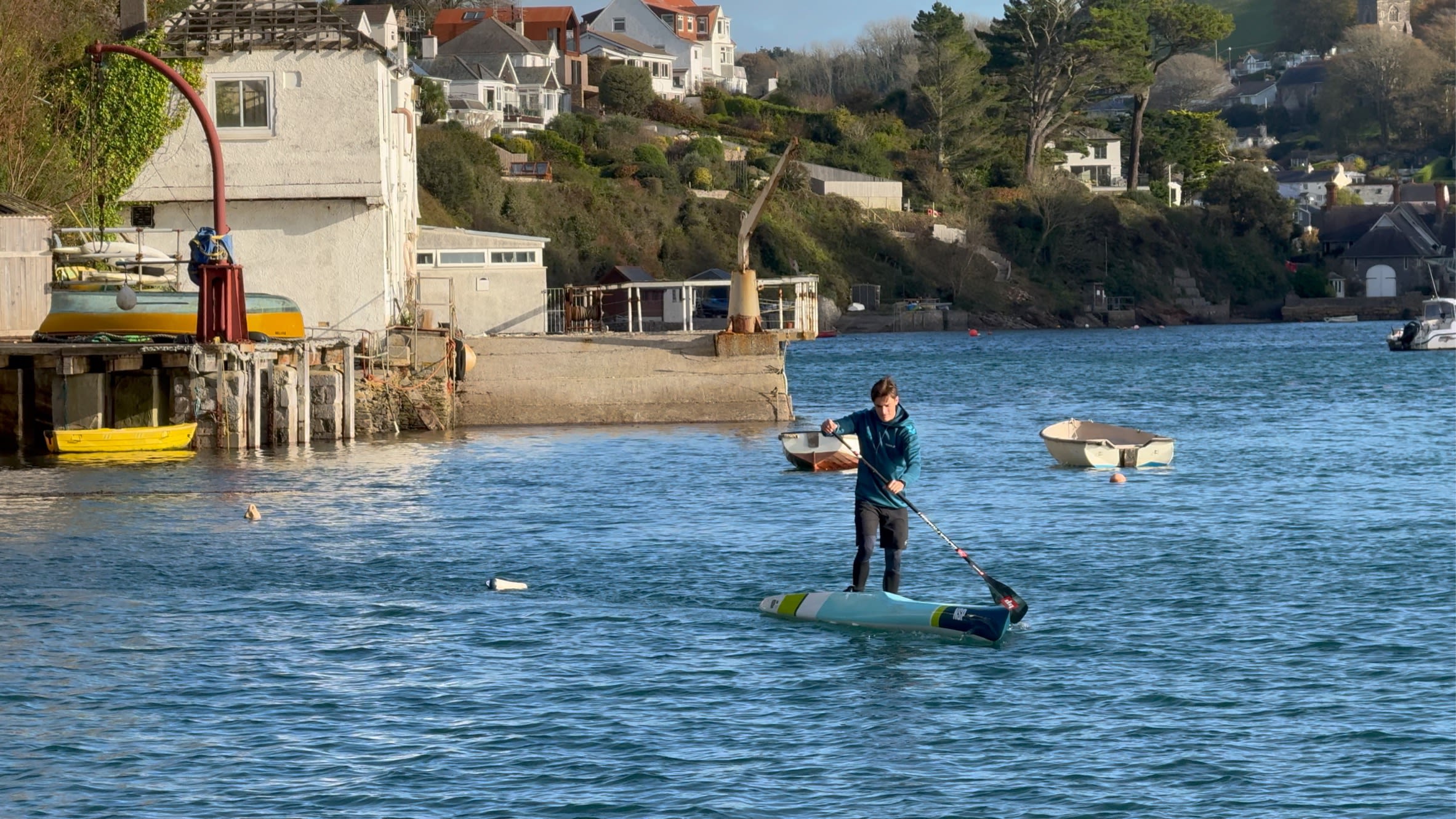
SUP boarding was declined for the LA 2028 Olympic games, despite the International Surfing Association’s (ISA) best efforts for its inclusion, the ISA are the governing body of the sport at the Olympic level, even though the sport has not yet reached it to the Olympics. With this being said, the ISA is still heavily pushing for the sport to make it to the 2032 Olympic games in Brisbane.
Samantha has seen the rise of the sport and has high hopes for SUP racing being introduced into the 2032 Olympic games in Brisbane. She said: “We meet a lot of the criteria that the Olympic commission says you need to have before it can become an Olympic discipline, it’s got to be in so many countries, it’s got to have male and female participants, and I think we pretty much tick all the boxes for that.”
Similarly, Blue said: “I’ll be 30 years old at the Brisbane games, so I’ll still have a little bit of time left, it would be an amazing achievement to represent my country at the Olympics. But hearing that we were shortlisted for the 2028 Olympics and it got declined, was pretty gutting as I would have been 26 years old which would have been a great age for me and would have been a great goal to set in the coming years.”
“The competition now is definitely getting fiercer, with the new generation of paddlers coming through it’s really tough.”
The sport is gaining new competitors year after year and Blue has been able to witness this throughout his SUP journey, he said: “Over the last few years we have seen the sport growing massively, before there were maybe three or four guys who would turn up to the race and you would know they would be the top few in the race, but now you can go to a big event and there’s maybe 10 to 15 people and any of them could be on the podium. We have a new generation of really good paddlers coming through, so there’s definitely a lot more great racers to compete against and this makes it even more difficult.”
Samantha added: “I think there’s something about having longevity in SUP, it would be amazing to see Blue compete at the Olympics, or even coach the younger ones as well because passing on the knowledge, he’s got a huge amount of experience from him and his dad.”
Samantha mentioned Blue possibly coaching, if he does not take part in competing, due to the age which he will be at the next Olympics. This is due to the lack of qualified SUP coaches which the sport has, there are not many people with the knowledge of SUP racing that the current racers like Blue have. This further field of knowledge and expertise could push the next generation bounds further in their SUP career.
When speaking on the of shortage with SUP coaches, Samantha said: “We haven’t got those people in SUP at the moment, whereas other sports do because we haven’t got coach development, I think we should have access to that because we have potential Olympic contenders for the future or potential Olympic coaches, such as Blue. Some of the younger lads really look up to Blue for inspiration, we need more of them to want young people to get involved.”
Below is a video of where Blue carries out his training whilst he talks about the benefits which the sport has on his mental health and any set backs which he has faced in his SUP journey so far.
When speaking on the coaches in SUP, Samantha added: “We have got Larry Kane, he’s a canoe coach that came across to SUP so he understands paddle technique, but we haven’t really got a top-tier SUP coach instructor. We have some really good coaches out there, but I think those people are likely to move into the coaching roles to actually bring on the younger generations.
“We have got a real lack of young people in the sport. There's some really good work from people like Anna Little and Andrew T who are trying to develop the juniors to make the sport more accessible.”
Samantha expressed that she would love to have the opportunity to help coach those racing in SUP, especially if the sport made it to the 2032 Olympics in Brisbane, she said: “My love is actually coaching people and getting people their training plans, everything that goes with being a performance coach. I really enjoy that so if I’m still doing it, that would be brilliant.”
The future of SUP
With the sports continuing growth SUP and its athletes are likely to remain hopeful for a brighter future. But many people, like Samantha and Blue think there is still a long way to go. Unlike many other sports where it’s unlikely that the elite athletes have to work jobs elsewhere alongside their training, for SUP this is not the case, Blue still has to work full-time in his parents shop where he balances training and work life.
When speaking on the topic of work, Blue said: “It’s still not enough to make a full living off it yet, I’m trying to balance my training before and after work and then still have to balance a social life, so it’s tricky, you do have to sacrifice a lot of commitments to it, but I enjoy it and it works for me.”
Like any sport it is important to stay resilient, mentally and physically, all of the best professional athletes have stuck to being resilient and have not backed down, Samantha explained that in SUP racing, some of the older athletes are at more of an advantage as they are more likely to have been mentally challenged in their life time as well as having built the muscle to take part in racing, she said: “It’s nice if you have got a young person that has got the physiological adaptations, also having the mental resilience to be able to do some of the endurance distance because we find that younger people haven’t experienced as much in life to develop their mental resilience, but when you find those that have got a good mental resilience and the ability for physiological adaptations, it’s amazing.”
Whilst Samantha is working within the SUP industry for Paddle UK, she is actively trying to push for the funding in the sport to make sure the athletes are gaining the best possible experience, she said, “I would love to see it grow, I would love to see more investment in the youth development and coaches to develop the youth that we have got. I would also love to make it more accessible to young people that don’t have disposable income because boards are not cheap.”
Not only for the future generation of racers does the sport need funding but also for the current racers like Blue, the funding for competitions such as the World Championships, is basic. Samantha said: “One of my roles within Paddle UK is to start getting funding for our athletes because we need it, this year was the first year the entry fees were funded as well as kit and insurance, but when it comes to actual travel, flights and accommodation, all the expensive stuff, we haven’t got a pot for funding at the moment so were looking at options around sponsorship and getting big sponsors on board. It needs work massively but hopefully we will grow some more.”
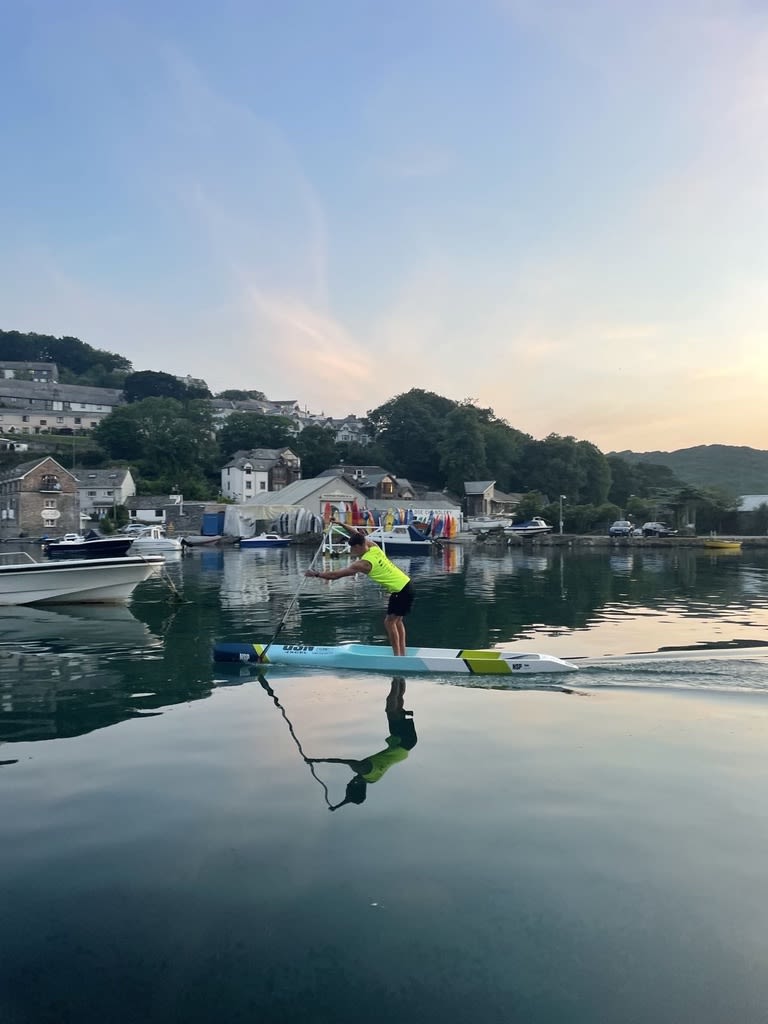
Blue training at the River Yealm, photo take by Izzy Jackopson
Blue training at the River Yealm, photo take by Izzy Jackopson
“How as a community can we support our athletes that are going to race?”
So, as the world of SUP continues to grow, there is hope for a brighter and more accessible future. From enhancing the level of coaching standards to the boosting in funding and inclusivity of SUP within the sporting world, the sky is the limit for those on the water- or should we say, the sea.




